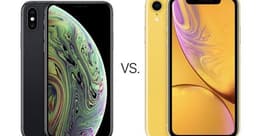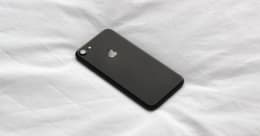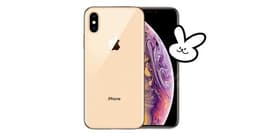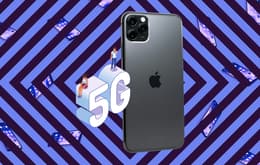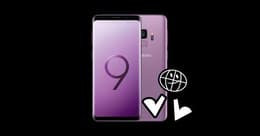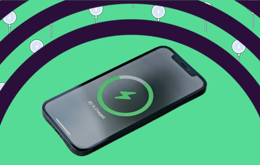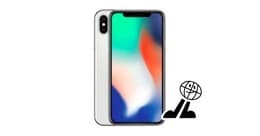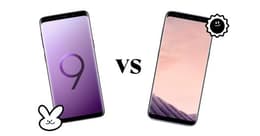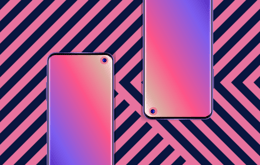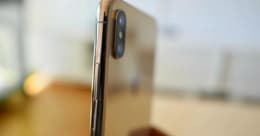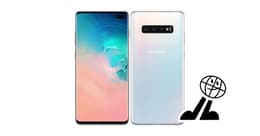
Two names consistently stand out in the growing world of smartphones: Apple’s iPhone and Samsung’s Galaxy. Choosing between these two giants can be a big commitment, given their distinct ecosystems and features. Read ahead for an in-depth iPhone vs. Samsung comparison that details design, user experience, camera capabilities, performance, ecosystem integration, and device pricing.
There are several excellent modern-day smartphone manufacturers, but the two pioneering brands remain the most popular and advanced. In many ways, it's still a Samsung vs iPhone market. The decision between the two depends as much upon brand loyalty as it does on things like functionality, design and app ecosystem.
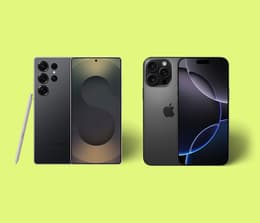
Why you can trust our Samsung vs iPhone comparison
Electronic devices are our bread and butter. Many years of trading refurbished products online have given us deep insights and broad experience in what distinguishes an average smartphone from a premium one. We also thoroughly understand the specifications and performance benchmarks of each model, which allows us to compare phones in a knowledgeable way that you can rely on. As soon as new models are released, we put them through their paces. We then provide expansive, honest reviews that you can trust to be objective, like this Samsung Galaxy S23 Ultra review. Not only that – we stay bang up to date on the latest market trends, so we're able to place our comparisons within that context. This gives you a holistic view of the best smartphones to buy for your specific needs, reliable comparisons between brands and models and prices that are consistently below what you would pay if you were to buy new.
Now let's get into it…
Samsung vs iPhone operating system
The operating system software is the most significant difference in the Samsung vs an iPhone debate, besides the physical hardware.
iOS for iPhone
Apple’s iOS offers a consistent and user-friendly interface across all iPhone models. This makes the experience familiar if you’ve had an Apple device in the past.
iOS has features focused on device security, like Face ID to keep unauthorised users out, easy system updates and data encryption. Additionally, iOS offers features like AirDrop for quick file sharing between other Apple devices, Siri voice-activated digital assistant and seamless integration with other Apple services such as iCloud and Apple Music.
Android for Galaxy
Samsung Galaxy devices run on Android OS, an operating system with flexibility and personalisation options. Nearly all phone models except for iPhones run on Android. If you’ve had other Android-run phones, like a Google Pixel or Motorola, the Samsung Galaxy will feel familiar.
Android allows users to customise their home screens and use third-party widgets. Samsung adds its own flair with the One UI, which offers features such as Edge Panels for quick access to apps and contacts. It also offers Samsung DeX to use your Galaxy more like a desktop computer than a smartphone.
App availability
App support is a critical thing to consider when buying a smartphone. It's where the real power and versatility of these devices come to the fore. The security of the app outlets and the integrity of the apps are important here.
Apple App Store
The App Store offers important security features, like app sandboxing, which restricts third-party apps from making changes to your iPhone or from accessing files stored by other apps. The App Store also has strict criteria for third parties to upload apps, ensuring that all apps are high-quality and secure.
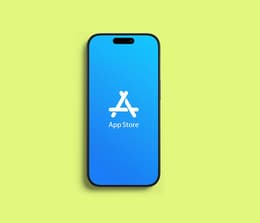
Google Play
Samsung Galaxy phones and all Android phones use the Google Play Store. The Google Play app approval process is less stringent than Apple’s; however, all apps are checked for malware or viruses and for overall quality. Most major apps found on the App Store can be found on Google Play.
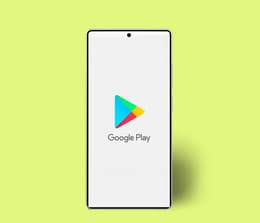
Ecosystem and compatibility
The Apple ecosystem
Apple devices, like the iPhone, iPad, MacBook, Apple Watch and Apple TV, work together seamlessly in Apple’s ecosystem. Features like Handoff let you start a task or listen to a podcast on one device and finish it on another. Continuity allows for calls and messages to be taken on any device, too. iCloud, Apple’s cloud storage system, allows your data to be accessible across all devices.
The Samsung Galaxy ecosystem
Galaxy smartphones integrate well with Samsung tablets, smartwatches, TVs and smart home devices. Features like Quick Share and Samsung Cloud provide data transfer, device syncing and backup solutions on multiple devices. Samsung’s SmartThings app allows users to control their smart home devices from their Galaxy phone. Additionally, Samsung’s partnership with Microsoft brings enhanced productivity features, including seamless syncing with Windows PCs.
Design and build quality
The Apple iPhone brought several innovations and was long the gold standard for smartphones. However, Samsung caught up fast and has competed at the highest level for many years in both design and build quality.
Apple iPhone models
Apple’s iPhones use either aluminium, titanium or stainless steel on the outer body, depending on the model. The iPhone 15 Pro and Pro Max use titanium to lighten the device’s weight, while the iPhone 14 uses aluminium and the iPhone 14 Pro and Pro Max use stainless steel. Apple uses Ceramic Shield glass in all models beginning with iPhone 12. Many of these models have a glass back as well.
iPhone models starting with iPhone 13 are IP68-rated, so they’re dust-tight and water-resistant. This means your phone can be submersed in a depth of up to 6 metres for up to 30 minutes without damage. Older models are also dust-tight and water-resistant but to a lesser degree.
Nearly all iPhone models no longer have the home button, a once-standard design feature that was removed in 2017. The most recent model with the home button is the iPhone SE (2022).
Samsung Galaxy models
Samsung Galaxy phones focus on practical design elements, such as ergonomic curves, to make their large-screen phones comfortable and easy to hold.
Many Galaxy phones use Gorilla Glass or Gorilla Glass Victus, which can be up to four times stronger than other phones that use an aluminosilicate glass composite. This glass was introduced on the Galaxy Note 20 Ultra. If you tend to drop your phone, Galaxy’s strong glass may be a good reason to make the switch.
Newer Galaxy models' bodies are made of titanium (S24 Ultra) or armour aluminium (S24 and S24+). Select older models, such as the S21, use durable plastic instead of Gorilla Glass for the back. Galaxy Ultra phones, beginning with the S21 Ultra 5G, come with a built-in S Pen stylus as well.
Performance and hardware
This is where the rubber meets the road. A stylish, well-built smartphone is only an ornament without advanced hardware and fast, smooth performance, whether it's for taking photos, gaming or keeping in touch on social media.
iPhone performance
iPhones are powered by Apple’s custom-designed chipsets, which are known for their performance and efficiency. A10 to A18 chips – which chip is used in which phone varies – provide excellent CPU and GPU performance, ensuring smooth multitasking, gaming, video-watching and more.
Battery life is optimised through a combination of hardware and software. You can check on battery health and usage, which are accompanied by activity insights and optimisation suggestions based on how you use your phone. iPhones support Qi wireless charging from the iPhone 8 onwards.
Storage options vary greatly depending on the model. Older phones can have as little as 16 GB of storage, while newer models can have as much as 1 TB.
iPhones also feature eSIM or Nano SIM for easier wireless network connection. Depending on the model, some phones include just an eSIM or Nano SIM card option.
Galaxy performance
Samsung Galaxy phones are equipped with powerful chipsets, such as the Snapdragon 888 or Exynos 2100, depending on the region. These processors deliver strong performance for all types of tasks, from gaming to productivity.
Galaxy devices often feature larger batteries, providing longer usage times. Galaxy phones support fast charging, starting with the S6 edge+, and Qi wireless charging, starting with the Galaxy S8 and S8+.
Storage options vary depending on the model. Galaxy models have storage options ranging from 16 GB to 1 TB. Many Galaxy phones also offer expandable memory via microSD cards. Select Galaxy phones also offer RAM Plus, which allows for memory expansion by using the phone’s storage as virtual memory, improving multitasking and performance.
Samsung Galaxy phones offer dual SIM, eSIM and Standard, Micro or Nano SIM cards, depending on the chosen model.
Camera capabilities and specifications
In the generation of the selfie, front-facing cameras have become as important as the typical back cameras used to take other types of photos. Both the Galaxy and the iPhone thus have high-spec camera systems, each with its own particular strength.
iPhone cameras
Some iPhone models feature dual or triple camera setups with advanced sensors and lenses that provide excellent photo and video quality. The more recent models feature a 12MP front-facing camera and a 48MP rear-facing camera, with additional MP ranges for zoom and ultra-wide settings. For the typical iPhone user, these features translate into consistently high-quality photos and videos without extensive manual adjustments or professional-level photography knowledge. Features like Night mode, Deep Fusion and Smart HDR ensure great performance in every lighting condition, from the beaming morning sun to midnight darkness. Portrait mode offers depth-of-field effects, so one object is in focus while the background is blurred. Video capabilities support 4K recording, cinematic stabilisation and ProRAW format for professional-grade editing. You can also use QuickTake to take photos while recording video.
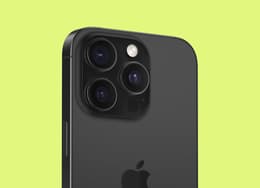
Samsung Galaxy rear cameras are available up to 200MP, a significantly higher resolution than the iPhone camera. The front-facing camera is anywhere from 4MP to 12MP, depending on the model you choose. Galaxy frame rate settings can be adjusted for smoother motion. These devices offer auto settings for photo capturing and video recording, as well as special settings like long-exposure photos, Night, Food, Panorama and Portrait mode for ideal picture-taking in all sorts of settings. For advanced users, Pro mode gives them control over features such as ISO for light sensitivity, shutter speed, white balance and manual focus to make the phone feel like a DSLR camera. Despite all of these features, the cameras are also really easy for novices to use. As one Reddit reviewer discovered: "I am not much of a camera person but the pics on this phone are fantastic for casual use. I love cameras where you don't need much effort or fiddling with settings."
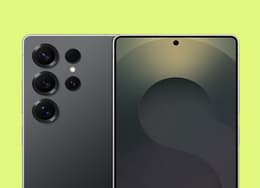
Price
Brand-new iPhones start at £429 and go up to £1,599. The price depends on the storage selected, the iPhone series and if you choose Pro, Pro Max, Max or Standard models. To get a great phone on a budget, refurbished iPhones offer the same quality. Back Market’s refurbished iPhones typically range from under £100 to around £1,500, depending on the model, storage size, the phone’s physical condition and other factors.
Brand-new Samsung Galaxy phones start at £399.99 and go up to £1,549.00, depending on the model and storage size. Just like the iPhone, Back Market offers refurbished Samsung Galaxy phones that bring the same features and performance quality as a new device for a wallet-friendly price. Back Market’s Samsung Galaxy price range is between under £100 and less than £1,400.
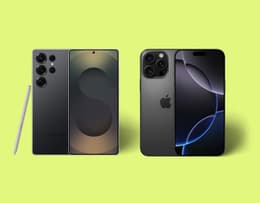
The Samsung Galaxy S25 Ultra and the iPhone 16 Pro Max are both exceptionally powerful, feature-rich smartphones.
"If you're after the biggest and best phone on the market in 2025, money no object, then the choice likely comes to these two options: the iPhone 16 Pro Max and the Samsung Galaxy S25 Ultra."
iPhone vs Samsung comparison chart
Feature | Apple iPhone | Samsung Galaxy |
|---|---|---|
Operating system (OS) | iOS | Android OS with Samsung One UI |
Chipsets (SoC) | A10-A18, depending on model | Exynos or Snapdragon, model dependent |
Central processing unit (CPU) | 6-core | Octa-core or Quad-Core, depending on model |
RAM | 2 GB-8 GB, depending on model | 2 GB-16 GB, depending on model |
Storage | 16 GB-1 TB, depending on model | 16 GB-1 TB, depending on model |
Full screen size | 4.7-6.7 inches, depending on model | 4.7-7.6 inches, depending on model |
Front camera | 7MP-12MP, depending on the setting and model | 4MP-12MP |
Rear camera | Up to 48MP | Up to 200MP |
Build materials | Stainless steel, aluminium or titanium frame, depending on model, + Ceramic Shield glass, beginning with iPhone 12 | Aluminium or titanium frame, depending on model, + Corning Gorilla Glass or Gorilla Glass Victus, depending on model |
SIM card | eSIM and/or Nano SIM, depending on model | Dual SIM, eSIM and Standard, Micro or Nano SIM, depending on model |
Phone measurements | Height*: 5.45”-6.42” Width: 2.65”-3.06” Depth: 0.29”-0.33” Depending on model | Height^: 3.34”-6.8” Width: 2.64”-3.11” Depth: 0.27”-0.34” Depending on model |
Weight | 144-240 grams, depending on model | 102-263 grams, depending on model |
Compatibility | Other Apple devices, wallets, watches, wireless chargers and more, depending on model | S Pen, Smart Watch, Microsoft computers, depending on model |
*The smallest iPhone measured is the iPhone SE. The largest iPhone measured is the iPhone 16 Pro Max.
^The smallest Galaxy phone measured is the Samsung Galaxy S10E. The largest Galaxy phone measured is the Galaxy S24 Ultra. Measurements do not include the Galaxy Z Flip5 or the Galaxy Fold.
Samsung vs iPhone pros and cons
Feature | Apple iPhone | Samsung Galaxy |
Operating system | Pros: iOS is seamless, with constant updates. Cons: Closed Apple ecosystem restricts customisation. | Pros: Android is more flexible and customisable. Cons: Less frequent updates. |
Build quality | Pro: Premium materials with a consistent design. Cons: Lacks design variety. | Pros: Premium materials in top models. Cons: Build quality not as good in lower-end models. |
Ecosystem | Pros: Excellent integration with other Apple products. Cons: Closed ecosystem inhibits interoperability. | Pros: Wide compatibility with third-party devices. Cons: Less cohesive than Apple's. |
Price | Pros: Consistent pricing and strong resale value.
Cons: Usually more expensive than other smartphones. | Pros: Wide price range for different types of users. Cons: Lower resale value. |
User experience | Pros: Smooth, intuitive interface.
Cons: Doesn't allow deep customisation for advanced users. | Pros: Flexibility allows for far more customisation abilities.
Cons: The customisation choices can be a bit too much for casual users. |
Apps | Pros: Apps are specifically optimised for smooth performance on iOS. Cons: Can only use Apple-approved apps.
| Pros: Agnostic Android system allows a much wider array of apps. Cons: Apps may not perform smoothly across all models. |
Security and privacy | Pros: Robust, secure software and user privacy protection. Cons: This can translate into less freedom for more tech-savvy people. | Pros: Strong security, with more granular user controls.
Cons: Many Android features rely on Google services, which can be a privacy concern for some. |
Shopping tips for iPhones and Galaxy phones
If you want a new smartphone, regardless of whether you prefer Samsung vs iPhone, there are a few ways of getting one at a reduced price. We all wait for the big yearly sales like Cyber Monday, and you can certainly pick up some great deals on those. The problem comes in if you need a replacement for a damaged phone and the sales are months away. You also run the risk of the device you want running out of stock in the rush before you can buy it.
Another tip is to wait until a new generation of phones comes out, and then snap up a previous generation model at a good discount when the shops clear their shelves in anticipation of new arrivals. Once again, though, you face the same timing issue.
That's precisely why Back Market exists. We offer discounts of up to 50% on the original recommended new selling price. And the best part? You can get these whenever you like. They're available 24/7, every day of the year. No more waiting, no more hoping that the phone you want will go on sale and no more scrambling with others to pick up a limited-time bargain. With us, you can get the completely restored model of your choice – whenever you choose to.
Why buy a refurbished Galaxy or iPhone?
Make your next phone a refurbished one with Back Market. Better for your wallet and the planet, a refurbished phone offers all the features you need for work and play without the price tag of a brand-new device. Transparent device grading and ratings, free 30-day returns and a 1-year warranty mean that you can shop for your new-to-you iPhone or Galaxy worry-free.
You'll also be one of thousands of eco-conscious people who are buying refurbished devices to help reduce the amount of electronic waste. A well-built smartphone that was only released a couple of years ago will still give you years of good use, especially one that has been fully restored to its original performance specifications.
Just ask one of our customers in a Samsung S23 Ultra review:
"First time, taking a 'punt' at a refurbished phone purchase & was not disappointed. Outstanding, fast (less than 48 hours) service from initial order to receiving my S23 Ultra (advertised as in excellent condition) & of which was in 'mint condition' at a price that is a fraction of the current retail price."
- (Henry B)
No matter which device you choose, shop now to find the best models and prices for your lifestyle. Read more on the reasons why you can trust our refurbished electronics.
Trade in your old devices for cash
Back Market isn't only one of the best places to shop for top-notch smartphones and other devices – we also offer cash for your old devices. Score yourself some extra dosh with our trade-in program. It couldn't be easier; fill in a quick form, giving us all the specs, and you'll very shortly receive an offer from one of our expert third-party refurbishers. If you like it, ship your device to us for free, and five business days later, you'll receive your payment.
Enjoy great value for money on Back Market
If you want to upgrade your smartphone, have a look at how much you can save on the latest Galaxy and iPhone models:
Model | Back Market price |
|---|---|
Samsung Galaxy S25 | From £499.83* |
Samsung Galaxy S25+ | From £719.00* |
Samsung Galaxy S25 Ultra | From £890.00* |
From £510.00* | |
Apple iPhone 16 | From £627.00* |
Apple iPhone 16 Plus | From £706.00* |
Apple iPhone 16 Pro | From £794.00* |
Apple iPhone 16 Pro Max | From £912.00* |
*Back Market prices taken at the date of publication – these are subject to change.
Final thoughts on Samsung vs iPhone
Choosing between an iPhone and a Galaxy ultimately comes down to personal preference and needs. If you value a seamless ecosystem, regular updates and a polished user experience, an iPhone might be the better choice. On the other hand, if you prefer customisation, a broader range of hardware options and cutting-edge camera technology, a Samsung Galaxy may be more suitable. Consider what aspects are most important to you, such as design, camera capabilities and ecosystem integration, to make the best decision for your newly refurbished phone pick.



